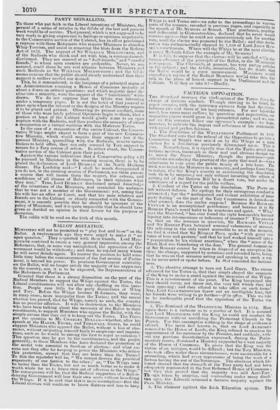PARTY SIGNALLING.
To those who put faith in the Liberal intentions of Ministers, the perusal of a series of articles in the Globe of the last and present
week would hoof service. That journal, which is not supposed to be
very ready in giving expression to feelings or opinions unpalatable to the Conservative section of the Cabinet, has in effect proclaimed a rupture with those Reformers who require Ministers to abandon Whig-Toryism, and assist in removing the blots from the Reform Act of 18:32. The support of Sir WILLIAM MOLESWORTH, and
of the Radicals who think and act with him, is contemptuously
disclaimed. They are sneered at as "half-friends," and "candid friends," to whom open enemies am preferable. Never, we are assured, could there be any real alliance between Ministers awl such Radicals BS Sir WILLIAM MOLESWORTH ; and the Gbibe seems anxious that the public should clearly understand that their support is neither needed nor desired. This, be it remembered, is the language of a principal organ of an Administration counting a House of Commons mejority of about a dozen on critical questions; and which majority must de- cline into a minority, were the support of the " half-friends" with- drawn. We do not suppose that the Globe was labouring under a temporary pique. It is not the habit of that journal to show spite when the interest or the designs of the Ministry require it to be placid and patient. Observing its present conduct, some of those who were lately political Optimists begin to think, that a portion at least of the Cabinet would gladly come to an open rupture with the Radicals, and thus produce the necessity of either a resignation or a virtual coalition with the Moderate Tories.
In the case of a resignation of the entire Cabinet, the Censer- Vative Whigs might expect to form a part of' the new Conserva- tive Ministry, which would require their support : but if the present Ministry, quarrelling with the Radicals, resolve never- theless to hold office, they can only succeed by Tory support in return for a Tory course of action. In either event, the Conser- vative section of the Cabinet gain their point.
Against the various indications that a Conservative policy will be pursued by Ministers in the ensuing session, there is to be placed the declaration of Lord DURHAM at the North Durham dinner. His Lordship said—" I shall be much disappointed if you do not, in the ensuing session of Parliament, see them pursue a course that will insure them the respect, the esteem, and confidence of all classes of Reformers, be their opinions what they may." True, Lord DURHAM disclaimed actual knowledge of the intentions of the Ministers, and reminded his audience that he was not a member of the Government: yet, seeing that his wife has an office at Court, and that his near relatives and friends are in the Cabinet or closely connected with the Govern- ment, it is scarcely possible that he should be ignorant of the policy of Ministers; and it is quite impossible that he should have given so decided an opinion in their favour for the purpose of deception.
The riddle will be read on the 20th of' this month.


























 Previous page
Previous page